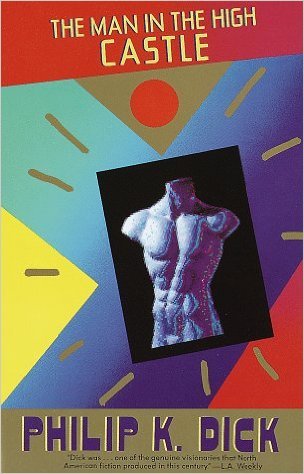 The Man in High Castle
The Man in High Castleby Philip K. Dick
reviewed by Abigail Lewis
Philip K. Dick immerses the reader in an exciting adventure through America’s 1960s when Japan and Germany won World War Ⅱ. The Man in the High Castle creates a world where Jews must change and hide their credentials, original American people must yield their dignity to the Japanese controllers, and there is a constant fear of revealing true identities. Mr. Tagomi, a deeply spiritual, high ranking Japanese government official, enjoys buying spiritual trinkets. He buys them from Robert Childan, who supplies them from an aspiring jeweler, Frank Frink. Juliana Frink, formerly married to Frank Frink, dates Joe Cinadella who works as a Natzi assassin to kill Howthorne Abendsen. Abendsen wrote the book, The Grasshopper Lies Heavy, a widely read, but outlawed book about what the world would be like if the Allies won the war. All the characters read the book, leading them to wonder what their lives would be like if the Allies won the war. They imagine equality between all people, religious freedom, democracy, and a sense of safety. As a result, Juliana Frink wonders if the book’s author knows the truth about this alternative world and therefore she sets out to find him. At the same time, Natzi’s also look for Abendsen. They want to kill him for spreading knowledge of a better life when they are not in control of the people in America. They want to silence this uproar of knowledge of a better life. The Man in the High Castle creates an alternative reality that helps the reader understand that knowledge creates mental, physical, and emotional power and strength.
Dick uses personal thoughts, perspective, and different character’s point of views to compare and contrast character's knowledge of a life where the Allies won the war or not, strengthening his theme of a better world because the Allies won. Dick uses third person to show how different characters act according to which side of the war they side with. Juliana describes Joe, “once more engrossed in the Grasshopper, scowling as he read, unaware of everything else”(Dick 149). The reader picks up on context clues that Joe’s character, who sides with Germany and Japan winning, resembles a rash and morally bad person. In addition, Dick uses single words through his novel to show his appreciation that the Allies won. Again, he describes Joe’s ignorance as, “unaware of everything else”(149). To emphasize the point, clear implications that ignorance leaves characters brainwashed and uninformed strongly shows when Dick writes in multiple character’s point of views and stories. Childan contemplates that , “It was out of the question to let a slave see him carrying something...he would never have place of any sort again” (23). Through the use of different character’s experiences in this society, the reader understands that he or she feels fortunate to not have to live in a society based on fear and social classes. Dick’s use of character's inner thoughts versus outside thoughts creates an unbiased argument for his vision of a correct society to show which characters are accepting of the new society and which are not.
No comments:
Post a Comment